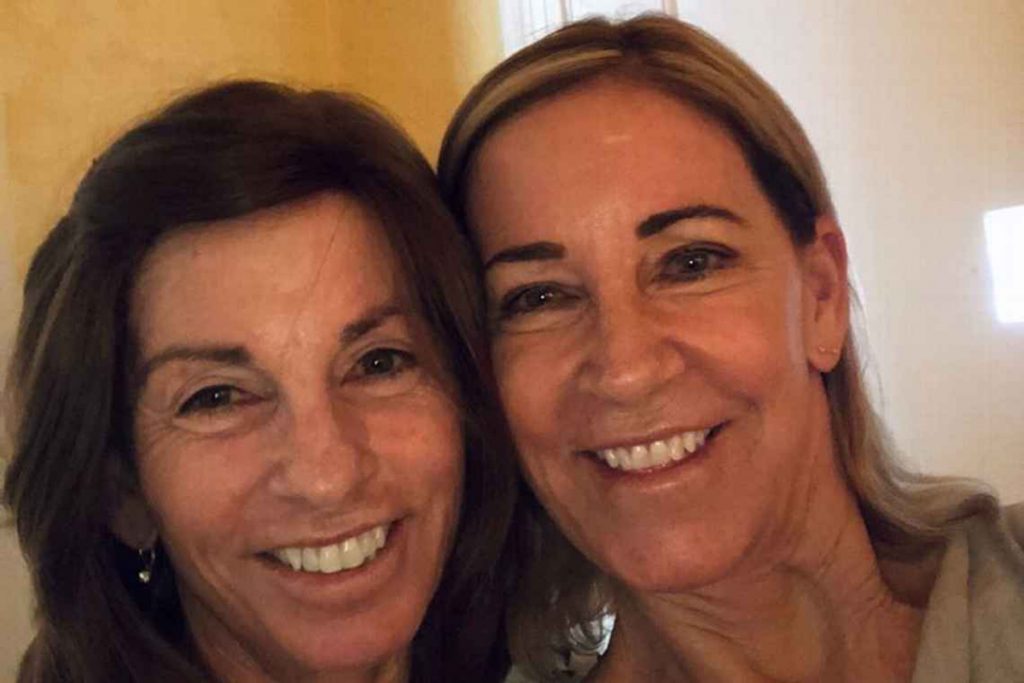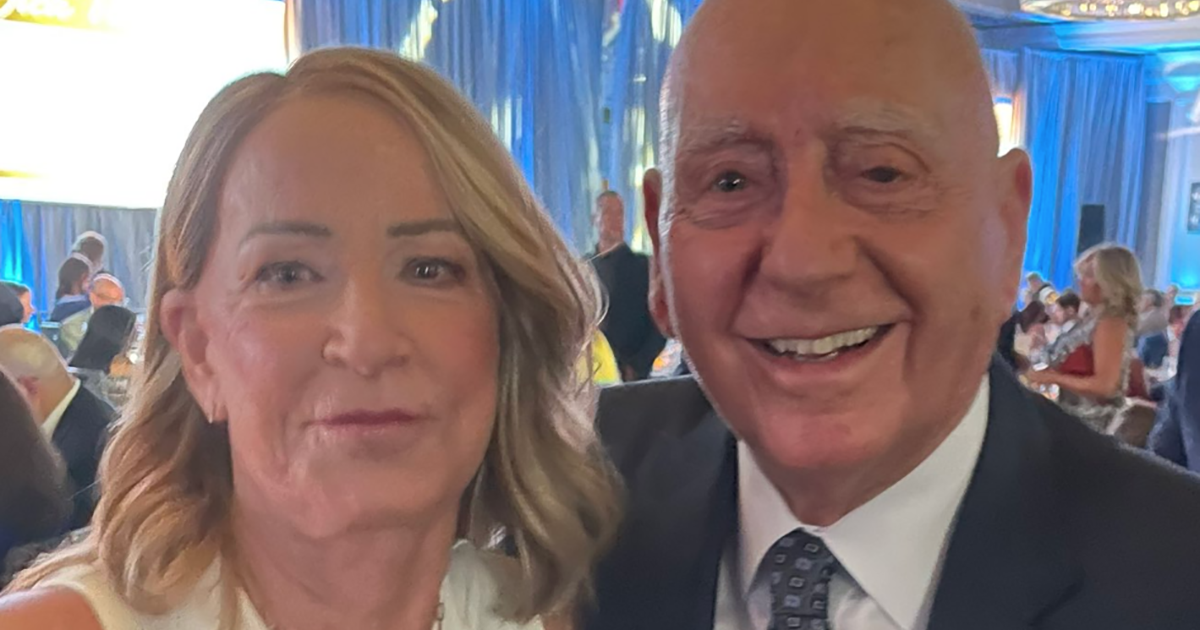Cancer Warriors Supporting Fellow Cancer Warriors
- Tennis legend and ovarian cancer warrior Chris Evert said she wouldn't let chemotherapy keep her from supporting her friend and fellow cancer warrior, Dick Vitale.
- In January, Evert shared the news of her ovarian cancer diagnosis. She began chemotherapy shortly after, and at the end of February, she shared that she was officially halfway done with treatment.
- Vitale is also a cancer survivor/warrior. In October 2021, the legendary sportscaster announced he had been diagnosed with lymphoma, just two months after revealing that he beat melanoma over the summer.
"We r (sic) so honored that legendary tennis Hall of Famer @ChrissieEvert is one of our honorees tonight where we expect to raise over $7 million for pediatric cancer research," Vitale, 82, posted to Twitter on Friday, May 6.
Read MoreCome hell or high water, even during chemo, I was not going to miss this special evening with an incredibly special man, @DickieV â¤ï¸ðŸ‘ https://t.co/GsJZREmMfb
Chris Evert (@ChrissieEvert) May 7, 2022
In January, Evert shared the news of her ovarian cancer diagnosis. She began chemotherapy shortly after, and at the end of February, she shared that she was officially halfway done with treatment.
Vitale is also a cancer survivor/warrior. In October 2021, the legendary sportscaster announced he had been diagnosed with lymphoma, just two months after revealing that he beat melanoma over the summer.
Chris Evert and Dick Vitale, both coming from the sports media world, are constantly supporting each other on social media.
Wishing you all the best in ur battle @ChrissieEvert / loved the pic I saw of Andy M taking u to ur Chemo treatment / we both r going to WIN THE BATTLE / Chris cancer can't Stop us . Keep fighting. My ðŸ™ðŸ™ðŸ™â¤ï¸â¤ï¸â¤ï¸with u to be CANCER free!
Dick Vitale (@DickieV) February 1, 2022
Chris Evert's Cancer Diagnosis
Chris Evert shared the news of her ovarian cancer diagnosis in an ESPN article published earlier this year. Her diagnosis and what it took to get there was described in vivid detail.
Her story is unfortunately not an uncommon one, but it has a more positive outcome than most ovarian cancer patients because the disease is often caught too late. In Evert's case, she is just stage 1.

When speaking about Evert's case specifically, world-renowned gynecological oncologist Dr. Beth Karlan of UCLA Health told SurvivorNet, "When she found out, at age 67, that her sister had this mutation (BRCA1), she got tested, found she had it too, acted on it, had the prophylactic surgery, and serendipitously was found to have a very early and likely curable ovarian cancer."
However, that wasn’t the case for Evert's younger sister, Jeanne Evert Dubin, who was also a professional tennis player. Dubin died from advanced-stage ovarian cancer in February 2020. She was 62 years old.
When Dubin was diagnosed with cancer, it was in its later stage, and it had spread. That is often the case with ovarian cancer, many SurvivorNet experts have told us. Ovarian cancer is almost impossible to diagnose early like in Evert's case because women don’t begin to show symptoms until the disease has reached its later stage. There are also no routine screening tests recommended for women who are at an average risk for ovarian cancer.
How did Evert catch her ovarian cancer so early? She found out she had the BRCA1 gene mutation and began to get regular cancer screenings.
The BRCA1 (BReast CAncer 1) or BRCA2 (BReast CAncer 2) genes help cells repair their DNA damage. Having a change, or mutation, in one of these genes increases a woman's risk of developing ovarian and breast cancer. These gene mutations are commonly passed down in families. If a parent carries a BRCA gene mutation, there’s a 50-50 chance you could be carrying it as well.
When Dubin, Chris Evert's sister, was going through cancer treatment, she had tested negative for the BRCA1 gene. Because of this, her family members, including Evert, weren’t encouraged to seek genetic testing themselves.
However, it was later proven that Dubin did in fact have the pathogenic BRCA1 gene, which increased her chances of developing ovarian cancer. This prompted Evert to "immediately" send her blood in for genetic testing, which revealed she also had the pathogenic variant of the BRCA1 gene. (Gene mutations can either be benign or pathogenic.)
Due to her increased risk of developing ovarian cancer, Evert decided in collaboration with her doctor to have a hysterectomy, which is a surgical procedure to remove the uterus. She had this procedure done first as her sister died from a type of gynecological cancer, but a mastectomy surgery that removes the entire breast was planned for later down the line as BRCA1 can also increase a woman's chances of developing breast cancer.
But a proactive measure Evert's hysterectomy turned out to be a necessary step in her own cancer journey, as pathology following her surgery revealed malignant cells and a tumor originating in Evert's left fallopian tube.
Cancer Warriors Supporting Fellow Cancer Warriors
Cancer warriors like Chris Evert supporting fellow cancer warriors like Dick Vitale is a powerful thing. Having cancer is a community one no one wants to be a part of, but that only makes the bond stronger.
The support from family, friends, or even those who understand what you're going through, is what's going to get you through.
This is something fellow cancer survivor Kelly Sargent can agree with. She moved to San Antonio, Texas, not knowing anyone, but she says she's been "blessed with having met some incredible ladies."
The Benefit of Support Networks for Cancer Patients
"When I was diagnosed (with ovarian cancer), as soon as I got in the hospital, I started going online to find not only information, but also support groups, stories from survivors, anything that I could find as far as my treatment I definitely looked for," she previously told SurvivorNet.
"I have an incredible set of friends that I met after my diagnosis through a Bible study group that have become very, very close friends of mine that are an incredible part of my support system. That support from those ladies has been life-changing for me."
Learn more about SurvivorNet's rigorous medical review process.

